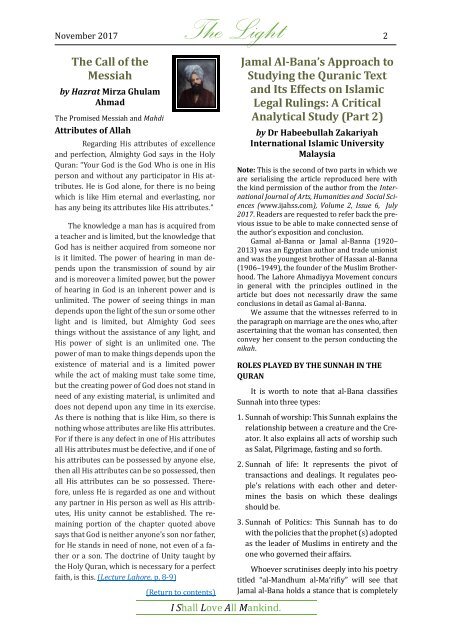The Light English Edition November 2017
Organ of the Ahmadiyya Association for the propagation of Islam. Presenting the Islam taught by the Holy Prophet Muhammad (s), a tolerant, inclusive, peaceful, rational and scientific religion.
Organ of the Ahmadiyya Association for the propagation of Islam. Presenting the Islam taught by the Holy Prophet Muhammad (s), a tolerant, inclusive, peaceful, rational and scientific religion.
Create successful ePaper yourself
Turn your PDF publications into a flip-book with our unique Google optimized e-Paper software.
<strong>November</strong> <strong>2017</strong> <strong>The</strong><br />
<strong>Light</strong> 2<br />
<strong>The</strong> Call of the<br />
Messiah<br />
by Hazrat Mirza Ghulam<br />
Ahmad<br />
<strong>The</strong> Promised Messiah and Mahdi<br />
Attributes of Allah<br />
Regarding His attributes of excellence<br />
and perfection, Almighty God says in the Holy<br />
Quran: “Your God is the God Who is one in His<br />
person and without any participator in His attributes.<br />
He is God alone, for there is no being<br />
which is like Him eternal and everlasting, nor<br />
has any being its attributes like His attributes.”<br />
<strong>The</strong> knowledge a man has is acquired from<br />
a teacher and is limited, but the knowledge that<br />
God has is neither acquired from someone nor<br />
is it limited. <strong>The</strong> power of hearing in man depends<br />
upon the transmission of sound by air<br />
and is moreover a limited power, but the power<br />
of hearing in God is an inherent power and is<br />
unlimited. <strong>The</strong> power of seeing things in man<br />
depends upon the light of the sun or some other<br />
light and is limited, but Almighty God sees<br />
things without the assistance of any light, and<br />
His power of sight is an unlimited one. <strong>The</strong><br />
power of man to make things depends upon the<br />
existence of material and is a limited power<br />
while the act of making must take some time,<br />
but the creating power of God does not stand in<br />
need of any existing material, is unlimited and<br />
does not depend upon any time in its exercise.<br />
As there is nothing that is like Him, so there is<br />
nothing whose attributes are like His attributes.<br />
For if there is any defect in one of His attributes<br />
all His attributes must be defective, and if one of<br />
his attributes can be possessed by anyone else,<br />
then all His attributes can be so possessed, then<br />
all His attributes can be so possessed. <strong>The</strong>refore,<br />
unless He is regarded as one and without<br />
any partner in His person as well as His attributes,<br />
His unity cannot be established. <strong>The</strong> remaining<br />
portion of the chapter quoted above<br />
says that God is neither anyone’s son nor father,<br />
for He stands in need of none, not even of a father<br />
or a son. <strong>The</strong> doctrine of Unity taught by<br />
the Holy Quran, which is necessary for a perfect<br />
faith, is this. (Lecture Lahore, p. 8-9)<br />
(Return to contents)<br />
I Shall Love All Mankind.<br />
Jamal Al-Bana’s Approach to<br />
Studying the Quranic Text<br />
and Its Effects on Islamic<br />
Legal Rulings: A Critical<br />
Analytical Study (Part 2)<br />
by Dr Habeebullah Zakariyah<br />
International Islamic University<br />
Malaysia<br />
Note: This is the second of two parts in which we<br />
are serialising the article reproduced here with<br />
the kind permission of the author from the International<br />
Journal of Arts, Humanities and Social Sciences<br />
(www.ijahss.com), Volume 2, Issue 6, July<br />
<strong>2017</strong>. Readers are requested to refer back the previous<br />
issue to be able to make connected sense of<br />
the author’s exposition and conclusion.<br />
Gamal al-Banna or Jamal al-Banna (1920–<br />
2013) was an Egyptian author and trade unionist<br />
and was the youngest brother of Hassan al-Banna<br />
(1906–1949), the founder of the Muslim Brotherhood.<br />
<strong>The</strong> Lahore Ahmadiyya Movement concurs<br />
in general with the principles outlined in the<br />
article but does not necessarily draw the same<br />
conclusions in detail as Gamal al-Banna.<br />
We assume that the witnesses referred to in<br />
the paragraph on marriage are the ones who, after<br />
ascertaining that the woman has consented, then<br />
convey her consent to the person conducting the<br />
nikah.<br />
ROLES PLAYED BY THE SUNNAH IN THE<br />
QURAN<br />
It is worth to note that al-Bana classifies<br />
Sunnah into three types:<br />
1. Sunnah of worship: This Sunnah explains the<br />
relationship between a creature and the Creator.<br />
It also explains all acts of worship such<br />
as Salat, Pilgrimage, fasting and so forth.<br />
2. Sunnah of life: It represents the pivot of<br />
transactions and dealings. It regulates people’s<br />
relations with each other and determines<br />
the basis on which these dealings<br />
should be.<br />
3. Sunnah of Politics: This Sunnah has to do<br />
with the policies that the prophet (s) adopted<br />
as the leader of Muslims in entirety and the<br />
one who governed their affairs.<br />
Whoever scrutinises deeply into his poetry<br />
titled “al-Mandhum al-Ma‘rifiy” will see that<br />
Jamal al-Bana holds a stance that is completely














